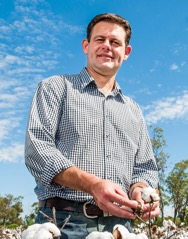January 29, 2020
Q&A with Fulbright Scholar Craig Baillie
Submitted by Communications and Marketing

As part of the national Fulbright Scholar Program, K-State's Oz to Oz Fulbright Scholars Seminar brings senior research scholars to campus to build and develop international partnerships and friendships.
Craig Baillie, professor and director of the Centre for Agricultural Engineering at the University of Southern Queensland Australia, presented "Will ag-tech save the world?" as part of the Oz to Oz Fulbright Scholars Seminar on Jan. 28 and will be on the Manhattan campus through Thursday, Jan. 30. Ajay Sharda, associate professor and the Patrick Wilburn — Carl and Mary Ice Keystone research scholar, is his K-State host. Baillie also serves as deputy executive director of the Institute for Advanced Engineering and Space Sciences.
This Q&A gives the university community an opportunity to learn more about the scholar speaker and reinforces the importance of mutual understanding and education of diverse research topics.
What is your field of study?
Agricultural Engineering
How is the Fulbright scholarship helping you increase knowledge of this area?
The Fulbright has allowed me to understand ag-tech developments in the USA and how major investments are panning out in terms of meeting future goals to feed and clothe the world. The ag-tech revolution needs to inform multiple objectives beyond this such as environment, sustainable practices and on-farm profitability, which the Fulbright has helped me to unravel. There are synergies between Australian and U.S. agriculture and my work is also using this experience to exploit opportunities through collaborative R&D, which realizes technologies and benefits to farmers earlier. Australia farmers operate in a volatile operating environment, which fuels innovation and early adoption of technologies that could benefit U.S. agriculture. On the flip side, the Australian farming sector needs mass markets in the USA and in other parts of the world — i.e. Europe — to sustain the commercialization of these technologies.
What drives your interest in your research?
Agriculture is fundamentally important to society servicing at least two of the three basic needs — i.e. food and clothing. I'm driven by my love of agriculture and a firm belief that the only constant is change. The most profitable and sustainable farming operations embrace this and by adopting innovation and new technologies they meet these challenges. I grew up on a cotton farm in Australia and worked for a large corporate farm before moving into the university sector. Innovation and technologies underpinned these operations and the attraction to the university sector was to have greater influence on the early stages of the technology pipeline.
Since the Fulbright helps to build collaborative relationships, in what areas do you want to collaborate with American researchers?
There are particular challenges facing farming in both Australia and the U.S., which could benefit through closer collaboration in the development of new technologies. My vision is to establish a collaborative research network or ecosystem with the USA that will provide a conduit for these developments. Successful engagement and collaboration in ag-tech development at this level also has potential to exploit global opportunities for Australia and the U.S.
Why did you accept the invitation to visit K-State?
Collaborative partnerships have been developed with a number of research institutions and corporations in the USA to serve my longer-term vision. The invitation to visit K-State is a great opportunity to extend that network. In particular, K-State is a big supporter of Fulbright and Fulbright has been a big supporter of my endeavors. I was pleased to accept the invitation and to seek opportunities to develop the relationship further.
During his visit, Baillie will speak with Eric Atkinson, host of "Agriculture Today." That interview, as well as all other Fulbright scholar interviews, are posted on the K-State Research and Extension News page.
